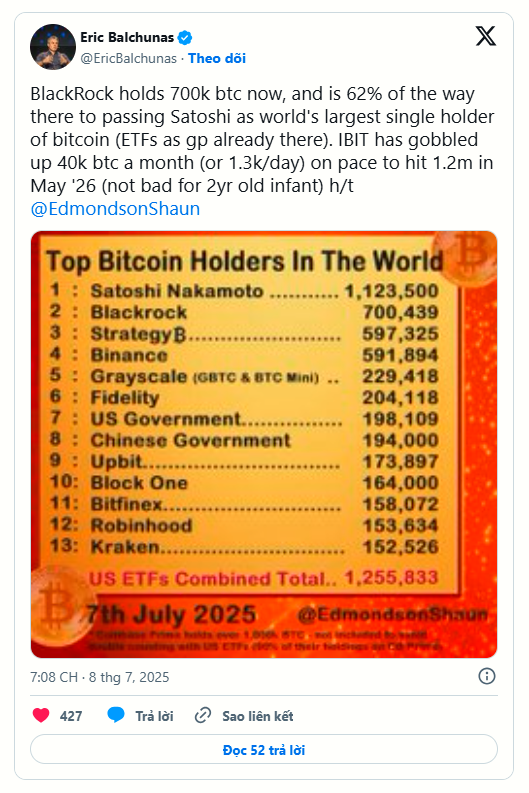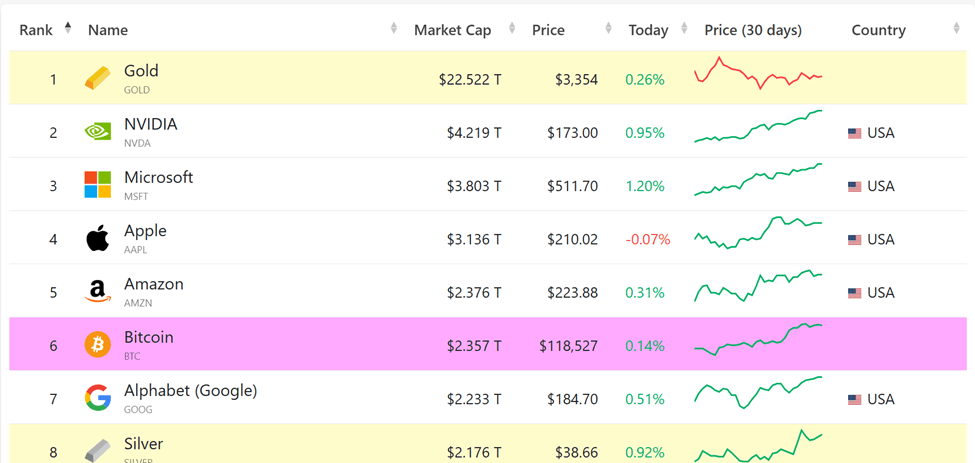Bitcoin (BTC) is at six figures, with institutional capital flooding the market. With this, analysts now face the question: Could Satoshi Nakamoto, the creator of Bitcoin, become the richest person on the planet before the year ends? With around 1.1 million BTC believed to belong to Satoshi, the BTC he holds is currently valued at over $130 billion at current market prices.
$320,000 BTC or Bankruptcy: What Will Help Satoshi Surpass Elon Musk
With favorable conditions, Satoshi could become the richest person on Earth before the year ends. This means surpassing the estimated wealth of $350–400 billion of Elon Musk, primarily tied to Tesla, SpaceX, and X (Twitter).
For Satoshi to surpass him, Bitcoin will need to reach a price from $320,000 to $370,000, increasing from 2.7 to 3.1 times the current level.
However, reaching that milestone is not just a price target. This is a referendum on the global adoption of Bitcoin, macroeconomic fluctuations, and the mainstreaming of digital assets in how investors, including institutions or TradFi, measure wealth.
In conversations with BeInCrypto, some experts stated that Satoshi Nakamoto is not impossible to become the richest person by the end of 2025, but they acknowledge that this timeline is too short.
Vikrant Sharma, CEO of Cake Labs, the company that founded Cake Wallet, shared with BeInCrypto that: "If not in 2025, then 2026 seems to be a certain time."
This means that although speculative, this price level is not unimaginable, with the timeline requiring a strong influx of capital, macro momentum, and breakthroughs in regulations.
Can Institutions Push BTC to $320,000 by Year-End?
Since Bitcoin Exchange-Traded Funds (ETFs) have been approved, investment momentum from institutions has surged. BlackRock's IBIT currently holds about 727,359 BTC.

Capital inflows into spot ETFs are far exceeding the expectations of many analysts, with reports indicating that BlackRock's IBIT ETF could reach $100 billion in assets this month.

However, Bitcoin rising from $118,000 to $320,000 in five months is not merely a continuation. It requires a historic scale acceleration.
Maksym Sakharov, co-founder and CEO of the decentralized bank WeFi, stated in a statement to BeInCrypto: "For Bitcoin to reach $320,000 in five months, institutional buying must surpass every number seen so far. That would require a significant move - such as the U.S. announcing strategic Bitcoin reserves or national investment funds pouring in heavily."
Even if the Treasury is strained, a dovish policy and geopolitical instability serve as drivers, the likelihood of things being fine by 2025 is very low, but not impossible.
Lennix Lai, CCO of OKX Global, stated: "This requires an event contrary to the black swan event... Institutional capital continues to flow in, positive news about regulations, major central banks easing policies, and large companies actively adding BTC."
The Exclusion Paradox: Why Satoshi Is Not on the Rich List
Despite holding enough Bitcoin to rival countries, Satoshi still does not appear on Forbes or Bloomberg's billionaire lists. Cryptocurrency, despite being a $3.9 trillion asset class, is still underrepresented in mainstream wealth rankings. Experts largely attribute this to custody, allocation, and transparency issues.
Sakharov pointed out that: "Satoshi would rank 11th globally if considering the amount of Bitcoin he holds."
While founders of exchanges like Changpeng Zhao (CZ) of Binance or CEO Brian Armstrong of Coinbase have made the list, most of their wealth is accounted for through company valuations rather than self-custodied cryptocurrencies.
"At this point, it is unreasonable... Their methodology seems increasingly outdated," he added.
Meanwhile, Sharma noted that self-custody of Bitcoin is reasonable as it is one of the largest asset classes by market capitalization.

Sharma also believes this choice is due to central banks continually devaluing fiat money, making Bitcoin more attractive.
"Why don't you hold the fifth largest asset by market capitalization? With central banks continually devaluing fiat money, a shift to sound currency seems unavoidable," Sharma told BeInCrypto.
Custody Rights, Disclosure, and the Future of Billionaires' Wealth Rankings
The infrastructure needs to catch up for cryptocurrencies to be treated equally to stocks or real estate. Custody audits, self-custody verification, and reporting standards are still under development.
According to Sakharov, current procedural challenges are overshadowing technical concerns, as asset managers still lack reporting standards that would give cryptocurrencies similar reliability to stocks.
Sharma added: "If assets are held through ETFs or Bitcoin fund management companies, reporting will be easier, but self-custody will complicate disclosure - and Forbes still doesn't have the capacity to handle that issue."
However, the situation is changing, with auditing becoming increasingly prevalent. Asset managers are gradually becoming more open to recommending a 5–10% allocation to cryptocurrencies.
National investment funds are also eyeing BTC, which could lead to the integration of cryptocurrency holdings into the global billionaire rankings.
The Billionaire No One Can Find
Meanwhile, Bitcoin is no longer something foreign. From ETFs to treasury bonds to central banks comparing it to gold, the pioneering cryptocurrency has fully entered the era of institutions.
However, its most mysterious holder, Satoshi Nakamoto, remains an anomaly, holding a block of assets larger than that of any country, yet absent from every rich list.
Whether Bitcoin reaches $320,000 this year or next, some may find it interesting to know who Satoshi really is rather than whether he will become the richest person in the world.



